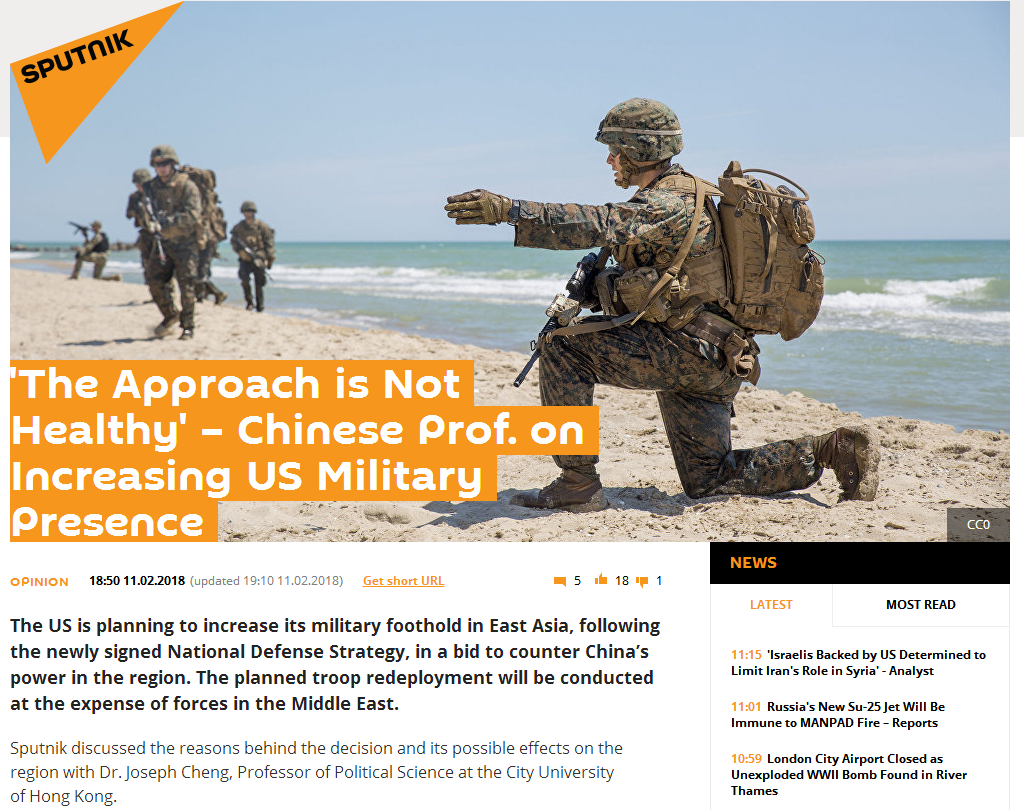Source: sputniknews.com
The US is planning to increase its military foothold in East Asia, following the newly signed National Defense Strategy, in a bid to counter China’s power in the region. The planned troop redeployment will be conducted at the expense of forces in the Middle East.
Sputnik discussed the reasons behind the decision and its possible effects on the region with Dr. Joseph Cheng, Professor of Political Science at the City University of Hong Kong.
Why is the US taking this step of increasing its military footprint in East Asia?
Joseph Cheng: It has to do with two sets of reasons, in the first place it treats China and Russia as rivals and it therefore believes it should enhance the American military presence in the region. It believes that by doing more, it is in a better position to ask its allies to do more, especially on a part of Japan and South Korea.
The other set of factors has to do with the fact that President Donald Trump does not believe that the United States has a serious budget deficit problem in contrast to his predecessor. He believes that his tax cut programs will solve the budget deficit problem in fact and therefore is willing to spend more. I think spending more will help to please the American military industrial complex as well.
It looks like it is very provocative, this action. What signal does it send out with regards of this move to China?
Joseph Cheng: China will be carefully monitoring the policy orientations of the Donald Trump administration. This is, of course, treated as a part of the broader picture. China is obviously very concerned that the Donald Trump administration treats it as a kind of rival. If the United States chooses to exert pressure on the economic front, then China is more willing to make concessions in terms of reducing its trade deficit, vis-à-vis the United States, to invest more in the United States and so on. But if the pressure comes from the military front, China will probably also increase its military expenditures as well.
And you think it is going to worsen the situation in the South China Sea now with this particular action?
Joseph Cheng: Probably so, because as we were saying, the United States under Donald Trump will probably spend more on the military. He is ready to enhance the United States military presence in the region and will exert pressure on American allies in the region to do the same, to do more in terms of military strength. So this kind of approach is not healthy, is not going to be helpful to reduce tension in the region.
The US is withdrawing troops from the Middle East and transferring them over to the South East Asia region. What is your particular take on this changeover?
Joseph Cheng: The United States probably now thinks the Middle East is less significant in the sense that the US is much more self-sufficient in the terms of oil and natural gas. Withdrawing some military forces from the region will allow the Donald Trump administration to declare the situation is under control that it is winning the war in Syria and so on and, at the same time, as we have been arguing, transferring the military to East Asia will show that the United States attaches a lot of priority to this region. And from the military’s tactical point of view it is more advantageous to transfer the military from one region to another while they then are withdrawing them back to the United States mainland.
Disclaimer: This article was originally produced and published by sputniknews.com. View the original article at sputniknews.com.














